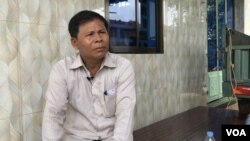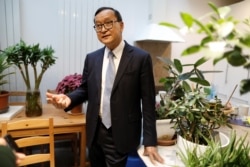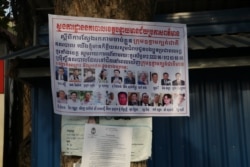Former Cambodia National Rescue Party district councilor Sun Thun was arrested from his home Monday morning. Local police arrived at his home in Kampong Thom province’s Taing Kouk district and detained him without even mentioning the charges against him.
Sun Thun’s arrest mirrors the detention of other former Cambodia National Rescue Party (CNRP) officials and members, many of who were stripped of their local government positions when the party was forcefully dissolved by the Supreme Court in 2017.
“They came with a car, they put him into the car and drove away,” said his wife, Seng Chanthorn.
“It is unfair to him. But it is not only Sun Thun. There are many,” she added.
The arrest of Sun Thun and others illustrates the precarious position lower-level CNRP members find themselves in, a scenario probably unfathomable just three years ago.
On June 4, 2017, the CNRP leadership was brimming with confidence as preliminary results of the commune election trickled in. With official results weeks away, media reports showed that the party had consolidated gains made in the 2013 national election.
The opposition party won close to 500 commune chief positions across the country – short of their expectations but far more than the few dozen seats won by the Sam Rainsy Party and Human Rights Party, combined, in 2012.
But the excitement was short-lived. Around two months after their impressive electoral showing, party president, Kem Sokha, was arrested in a midnight raid on September 4 and whisked away to the Trapaing Plong prison along the Vietnamese border.
Senior CNRP leaders quickly left the country fearing they were next, and lower-level officials quietly slid into Thailand - many fleeing following the dissolution of the party.
The government intensified its alleged color revolution narrative to justify Kem Sokha’s arrest – who has yet to be prosecuted for any crimes – and to push forward Supreme Court proceedings to completely dissolve the party.
This disbanding of the opposition party happened on November 16, 2017, when the Supreme Court ruled in the government’s favor – immediately stripping the CNRP’s 5007 commune councilors of their elected positions.
In the three years following the commune election, much of the government’s repressive actions have been directed at former members, activists, and council members – Sun Thun being the most recent.
The former CNRP district councilor’s sister-in-law, Seng Chanthou, was the commune chief for Taing Kouk district’s Treal commune. Now stripped of her position, Seng Chanthou, 50, said she was still under surveillance and intimidated despite holding no official position in local government or the CNRP.
“They watch our every step when people visit me. The local police are [routinely] driving past our homes,” Seng Chanthou said.
Rights group Human Rights Watch has documented the recent slew of arrests involving former CNRP members. Many of these arrests, the rights groups said, was under the guise of cracking down on alleged COVID-19 fake news.
From January 2020 to April, Human Rights Watch documented at least 30 arrests of opposition officials, 16 of who have been charged with varying crimes, such as incitement, conspiracy, and inciting military personnel to be disobedient.
CNRP leadership overseas has documented at least another four arrests in the past six weeks and Radio Free Asia reported in May that at least 16 people linked to the party have faced physical violence since August 2019. This was immediately after exiled opposition leader Sam Rainsy said he would return to Cambodia on November 9, 2019, but was eventually blocked by the government.
Additionally, the government arrested at least 74 CNRP members for purportedly supporting Sam Rainsy’s planned return, only to be released later, but with charges still hanging over them. Sun Bunthun, a former Baray commune councilor, and Sun Thun’s brother was one of the 74.
The government has been reticent about these arrests and local media, mostly affiliated or loyal to the ruling Cambodian People's Party, have only occasionally reported on these detentions.
Kri Sarith, Treal commune police chief, said Sun Thun was arrested using an arrest warrant issued by the Phnom Penh Municipal Court. He refused to provide any additional details, referring queries to officials in Phnom Penh.
“I followed the summons from the Phnom Penh court,” he said.
Kuch Kimlong, a Phnom Penh Municipal Court spokesperson, did not offer any information about Sun Thun’s case.
“I will let you know when I have information,” he told VOA Khmer on Tuesday.
As the government has increased its investigations into the alleged crimes committed by provincial CNRP members, the number of case files in Sam Sokong’s possession has proportionally increased.
The lawyer, who routinely represents CNRP members, has defended at least 100 cases in the last year, with 16 active cases in courts as of this week. He said the charges placed against his clients, such as inciting military personnel, only proves that these cases are politically motivated.
“All of these are political cases. It is pressure for the [government] to stop the opposition party from doing politics,” he said.
While 118 senior CNRP members were banned by the Supreme Court from the political arena for five years, other members face no such ban, but say they have been unable to express their opinions freely on political issues.
Justice Ministry spokesperson Chin Malin pushed back at any assertions that these cases were politically motivated, instead, calling them “evidence-based” investigations.
“Only prosecutors know how dangerous the activities [of arrested people] are and what is behind [these charges],” he said. “You and I don’t know that.”
While the CNRP had made considerable progress by winning 55 National Assembly seats in 2013, the 2017 commune election results would have had a more far-reaching impact on its political presence in the country, especially beyond the capital, Phnom Penh.
With its 5007 commune councilors, the party would likely have seen a significant increase in provincial and district council positions –potentially controlling the council in Phnom Penh, where it won a majority of commune chief positions. The party would have also made gains in the 2018 Senate election.
It was this prospect, of greater CNRP presence at sub-national councils, that led the government to put a stop to the opposition’s progress, said Phil Robertson, deputy Asia director for Human Rights Watch.
“The CNRP’s success in June 2017 elections challenged the ruling Cambodian People’s Party control of the countryside, and unfortunately, it became quickly clear PM Hun Sen and his authoritarian government would not permit that.”










